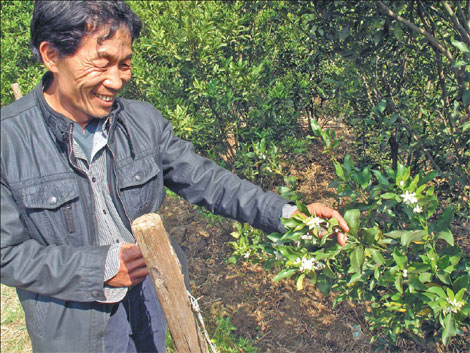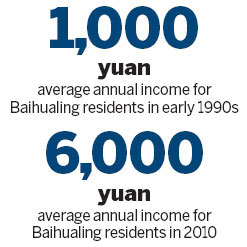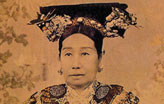Changing fortunes
Updated: 2011-04-22 10:21
By Chen Liang (China Daily European Weekly)
 |
|
Baihualing villager Chen Shihou checks his blossoming tangerine trees. Chen Liang / China Daily |
The cultivation of cash crops such as coffee, chestnut and walnut, by farmers in a mountain region of Yunnan has meant not just higher incomes but also the preservation of the region's rich biodiversity
I find it hard to believe that the stout farmer standing in front of me, in trousers, coat, black leather shoes, a mobile phone sticking out of his leather belt, and talking with pride about his chestnut trees is the same person I interviewed during my first trip to Baihua-ling village in Baoshan, Yunnan province, 15 years ago.
I met Yang Zhixue, then 32, in his thatched bamboo hut. The ethnic Lisu man tried to serve me water from a big pot whose insides were caked with a thick layer of cornmeal, evidence of the pot having been used repeatedly to cook meals.
His young daughters were playing in the mud in front of his house, half-naked.
The destitution was so shocking that I can recall it vividly to this day.
I was there to report on the Gaolingong Mountain Farmers' Association for Biodiversity Conservation (FABC). Established in Baihualing on Dec 8, 1995, with support from the United States-based MacArthur Foundation and the Gaolingong Mountain National Nature Reserve, it is the country's first farmers' NGO working in the field of environmental protection.
Yang was among FABC's first 65 members. He joined the association so he could avail himself of the seedlings provided by the reserve administration and its guidance on planting cash crops such as coffee, chestnut and walnut.
"My family had only some 10 mu (0.67 hectare) of hilly land near the reserve then," he says.
"Before 1996, I planted corn on it, which brought in an annual profit of 2,000-3,000 yuan (213-320 euros) - 4,000 yuan at most. It was simply not enough."
Encouraged by the reserve managers and other members of FABC, he started planting chestnut trees in late 1995. And life has not been the same since for Yang and his family.
In 2010, his chestnut trees yielded 3.5 tons of chestnuts and earned him 10,000 yuan. His 8 mu of coffee, planted on the lower slopes, yielded 1 ton of coffee and earned him more than 20,000 yuan. The family also has 4 mu of persimmon trees.
 |
"When I tried to persuade other villagers to plant chestnut trees in 1996, rumors floated around that I was getting 50 yuan (for every convert) from the reserve," he says. "Some even said planting chestnut trees was meant for those too lazy to do anything else."
No one would harbor such thoughts now, says Hou Xingzhong, head of Baihualing village and fourth president of the association.
In the 536-household village of more than 2,400, he says, every family is growing two or three kinds of cash crops including coffee, chestnut, walnut, persimmon and tangerine. Some are planting them all.
"Before 1996, rice, sugarcane and corn were the major crops in the village. Now farmlands below 1,500 meters are dominated by coffee and tangerine; in those above 1,500 meters, chestnut and walnut are the major crops," says the 37-year-old farmer.
"There are only 30 mu of paddy fields left in Baihualing."
The FABC has played an important role in helping farmers shift from staples to cash crops, he says.
Working together with the reserve administration, the 150-member association, organizes regular training on planting methods, fertilizer management, seedling cultivation and crop protection.
"These FABC members are usually opinion leaders at the village level," says Li Zhengbo, deputy director of the reserve administration.
"They spread what they have learned from the association to more people. With villagers gradually shaking off poverty, the pressure on Gaolingong Mountain from the surrounding communities will ease.
"That was the whole purpose behind establishing the association in 1995."
Before 1995, the reserve's 124 rangers would spend most of their time arresting people for poaching and fining them for logging.
"We have not had to do these things for years now," Li says.
According to village head Hou, a Baihualing resident now earns 6,000 yuan a year on average. The figure was less than 1,000 yuan in the early 1990s.
"Logging and hunting are things of the past," he says.
"We don't have any time for that," says Chen Shihou, a Baihualing villager, with 35 mu of tangerine, 18 mu of coffee and 4 mu of lichee.
Standing in his garden filled with the fragrance of white tangerine flowers, he says his family of five hired a dozen seasonal workers in 2010, spending 20,000 yuan, to help with farm work.
His family's income for the year stood at 100,000 yuan.
"There was only one motorcycle in the village 15 years ago," says the farmer, 56. "Now, every family has motorcycles and many have cars."
In 2004, a black bear sneaked into the village from the reserve and injured a woman, but the villagers just scared it away.
"The bear would have been killed (for its meat) had this happened 10 years ago," Li Zhengbo says.
The FABC has not only raised Baihualing residents' awareness of the environment, says Li Jiafu, the first president of FABC, but has also made them more market savvy.
"Besides coffee and fruits, a few of our members have begun to cultivate shihu (Noble Dendrobium, a rare herb of the orchid family) since 2010 while some have opened nongjiale (literally "farmhouse fun", or rural resorts) for the growing number of tourists," Li, 56, says.
According to the former village head, between 60,000 and 70,000 yuan are needed to plant a mu of shihu.
"A shihu seedling is priced at 2.5 yuan and it must be planted in a greenhouse," he says.
But more villagers are now able to not only afford the investment but also bear any risks.
Liu Guangjie, 64, and his family of 11 have planted 1 mu of shihu and are convinced it will become the village's next major crop.
"The weather is just perfect for this plant, and the tree stumps (on which it grows) can easily be found in our forests.
"The price of 400 yuan for a kilogram is profitable," says the farmer, one of FABC's first members.
"Now we truly feel lucky to be living at the foot of Gaoligong Mountain."
Li Yingqing contributed to this story.
E-paper

War of the roses
European Chinese rose growers are beating their Chinese rivals at their own game
High-tech park gets big boost
At the source
Merchant of Venice
Specials

High-tech park gets big boost
Zhongguancun sets sights on being one of the top technology hubs in the world

Learning to close the gap
Thousands of students have benefited from Tibet middle school program set up outside the autonomous region

The Cixi story
Two books about the Empress Dowager cast new light on the iconic ruler.
